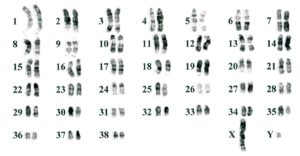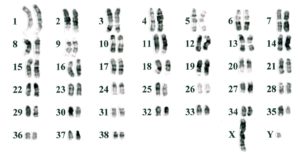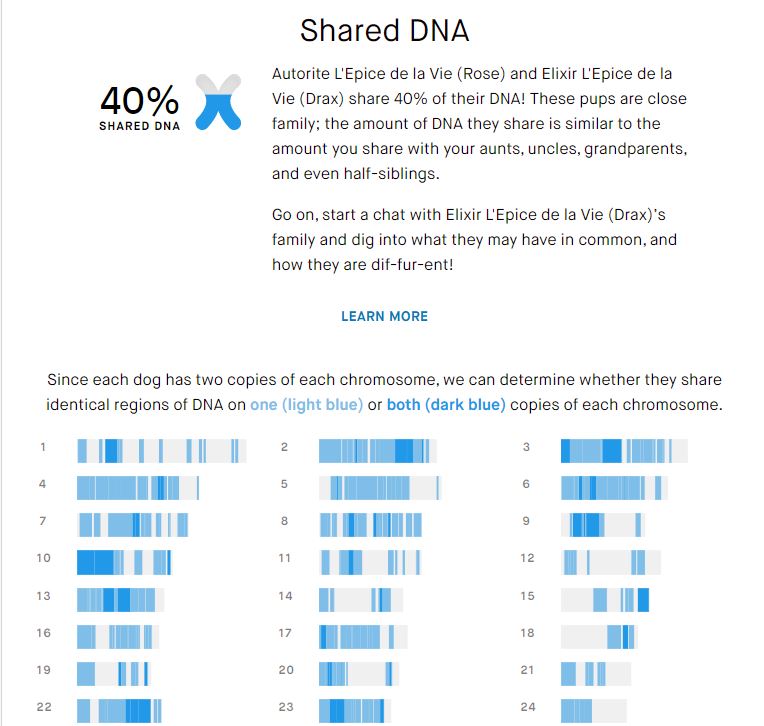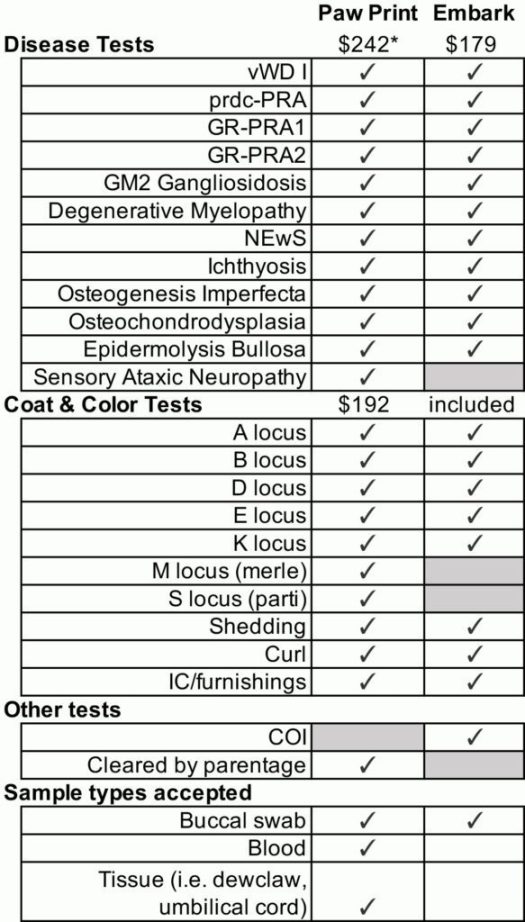Tag: Genetics
Merle Genetics: An Introduction
Lauren Trathen & Diana Densmore
Unlike many other well-established breeds that have genetic markers and recommended genetic testing to be completed, very little testing is done or encouraged for the Beauceron. A lot of topics of discussion over the years have surrounded our “harlequin” Beaucerons, their white marks, the tweed (oddly brownish spots), and their fading aspect. First and foremost, you must understand that when we use the term harlequin it is only because of its French origin and not because their color is due to the harlequin gene; harlequin Beaucerons are merle genetically speaking. The merle genetics in dogs are still being studied and researched by passionate leaders in the field, one of which is Mary Langevin. She is a well-known Catahoula breeder who quite literally wrote “the book” on merle, and is backed by the testing results she discovered in partnership with Tilia Labs in the Czech Republic.
Merle testing is one way that both owners and breeders can use genetic data to make better informed decisions and be able to educate others who come into our breed after us. Tilia Labs is the only analyst, currently, to identify and report on all seven alleles associated with merle. While it may seem that merle testing for black and rust dogs is not applicable, that is not the case. Most of us who have brushed the surface of merle genetics are aware there is M (Merle Dominant allele) and m (non-merle allele), but there are many more variations which can be more readily seen in other breed such as Australian Shepherds and Catahoulas. Beaucerons do NOT exclusively carry regular merle and non-merle; that is not how this works. Mc, Mh, Ma, Mc+, etc., are all variations of the merle alleles that can come with having merle in our breed.
Diana Densmore obtained permission from Mary Langevin to share (reprint) this article on understanding merle genetics that was originally written for the Australian Shepherd breed and to encourage all Beauceron owners, particularly those with “harlequins” but also black and rust dogs to be tested through Tilia Labs and to share those results with the breed community.
Mary Langevin – Unraveling the Mysteries of Merle

Canine Genetic Testing
Sarah Price
So, you want to have your dog’s DNA analyzed. Whether it is for fun, if you are concerned about health issues, or you are just curious, there are currently numerous options in this burgeoning industry, and more appear every day. This article provides a short summary of some of the available options and basic information so that you can make an informed decision about what method to use to meet your goals.

Commercial Testing
Embark and PawPrint Genetics are two of the most popular for-profit genetic testing companies. Embark is more likely to have the largest Beauceron dataset (n=54, to date), currently,. As of this writing PawPrints has not responded to a request for total number of dogs in the breed tested. While there are many others, such as Wisdom Panel, they are generally not recommended by the Beauce community or even in the general dog groups. As a result of this research, I did discover that Wisdom Panel is a partner of several animal rights groups which is not appealing to me, personally.
Embark
Embark is one of the more comprehensive DNA tests that provides data on breed identification, ancestry, coefficient of inbreeding, and genetic disease risk. Embark is in a partnership with Cornell University’s College of Veterinary Medicine and you have the option to contribute your dog’s results to their ongoing research. Embark also contributes funding to animal shelters for genetic testing and is the official DNA test of the Westminster Kennel Club. More importantly, Embark is the only company that has an option for sequencing the entire genome, although it does cost more. Embark provides reports for your veterinarian, OFA, and allows you to download the raw data for use in other genetic analysis programs (e.g., Plink). In other words, your dog’s genetic data is yours.
The downsides of Embark are several, but may or may not be deterrents depending on your goals or dog. It does not have an accurate merle gene test (actually, no one does except for Tilia Laboratories) but rather reports a heterozygous E-locus results. Embark focuses on a lot on breed identification, which in the case of a purebred dog is not particularly useful. However, if you run the test as an owner (not breeder) it does provide percents of shared genetic material with other dogs in their database. As more dogs are tested, you will receive notifications as new relatives are identified. So not only do you receive genetic relatives, you also get a Coefficient of Inbreeding based on DNA rather than calculated from pedigrees. The Breeder’s kit does not provide genetic relatives, however you will still receive COI information for each dog tested. Another nice thing about Embark is that as their testing evolves, your results are updated. Each dog’s DNA profile is archived permanently which means it is available in perpetuity.

Embark also tests for around 170 genetic markers associated with canine diseases. To be fair, no genetic markers have been identified as associated with specific conditions, however there are some markers that may be of import to you and your veterinarian when making decisions about health care.
Paw Print Genetics
Paw Print Genetics is a very popular test with breeders, primarily because you can test for specific panels of genetic diseases. They do not focus on breed identification, and because they partner with so many dog clubs and associations it is very popular in the purebred dog world. If you are looking to test for specific diseases, this might be the better test for you. Paw Print test panels can be cheaper, but not everything is included in one package so if you order multiple panels, or get into coat testing, etc., the cost can quickly skyrocket. The panels can be searched and purchased by breed (although, no Beauceron specific tests are available at this time), disease (e.g., DCM-specified to Doberman Pinscher), or symptom. Relative to Embark, some of the tests require or suggest blood samples over a buccal swab, which is an added expense as it must be obtained by your vet’s office. For instance, many of the coat related panels require a blood sample. They do offer discounts for multiple tests. The other aspect where Paw Print has a leg up over Embark is that a veterinarian reviews all test results and is available for counseling.
Paw Print Genetics does not bank sample material. However, according to their website any excess sample is stored for future testing. For instance, if a test becomes available for a Beauceron-specific ailment, you could ask if there is enough stored material to run a panel at a future date. Given this, Paw Prints does reserve the right to use excess sample in anyway they see fit.
Both companies allow for sharing of results online (shareable link), both have DVMs and PhDs on staff, double check results, and OFA accepts test results from both. However, Paw Print Genetics has vets/doctors overseeing testing, has a laboratory onsite, and will check results using different methods.

Academic/Non-Profit Testing
Another way to contribute to genetic research is through the National Human Genome Research Institute’s (NHGRI) Dog Genome Project. They are currently studying a multitude of health issue (canine kidney cancer, epilepsy, osteoarthritis, Addison’s disease, somatic cell carcinomas, retinopathies, and venereal tumors) as well as morphological research (body size, hair type and color, and skull shape). They are interested in rarer breed submissions and if you would like to contribute, you can contact them at dog_genome@mail.nih.gov.
Darkwin’s Ark is a citizen scientist project, meaning you are a contributing member to data collection and analyses. You can get on a wait list for a free test, or pay for a swab kit. The Beauceron is not yet included in their database, but they are always looking for rare breeds and more participants.
The CHIC DNA Repository banks your dog’s DNA sample and archives it along with corresponding genealogical and phenotype information (provided by you) for future testing and research specifically aimed at inherited diseases. You can submit a cheek swab ($5) which will be stored at the UC-Davis Veterinary Genetics Lab, or a blood sample ($20; obtained by a veterinarian) which will be curated at the University of Missouri’s Animal Molecular Genetics Lab. While parent clubs can contact the bank about specific research or opportunities, the final determinations are made by the respective laboratories and their researchers. UM is where the ABC’s DCM samples are curated for future research. You can find a list of diseases tested for here, and a list of genetic conditions accepted by OFA/CHIC from other companies, by breed, here.
Breed Genetic Research
There are also opportunities to contribute to studying the genetic composition of the Beauceron. Recently, Better Bred started a group for Beaucerons. They are a for-profit group that compiles samples of breeds and produces a report on the genetic health of the breed population, level of inbreeding, and other information geared toward breed management rather than health. They have opened up sample submission for Beaucerons and once the sample reaches 30-50 participants they will produce a preliminary report. At 100 participants, they will run the full analysis and provide a final report. If you want to see an example, the Berger Picard report is available online. The “research” phase costs $50 per sample and after that phase is completed, the cost of the test increases to $80. If you are interested in contributing, there is a Facebook group for the Beauceron community. Currently, seven dogs have contributed DNA samples.
Embark also launched a similar program and the ABC could submit a request to partner with the company to learn about the state of the breed, genetic health research and testing specific to the breed, and other genetic information. Since your Embark data is owned by you, the owner of the dog, any data is permissible for use and could be incorporated into any studies undertaken at the direction of the ABC.
Word of Caution
No matter which company you decide to utilize you should be aware that any health data resulting from the analysis of your dog’s DNA should be taken with a grain of salt. While the science of understanding the genetics of inherited diseases is making great strides, it is evolving and not a complete science–yet. Rather, you should view it as a contribution to future findings and research with the added benefit of learning about your dog’s genetics. There are programs like the Harmonization of Genetic Testing for Dogs which allow you to search for the best tests by breed or issue, as well as by ailment. Also, you should be aware that your dog’s health information is protected under HIPAA just like your own health information.